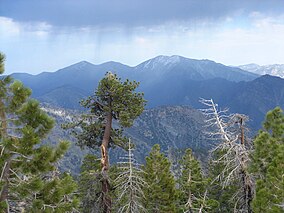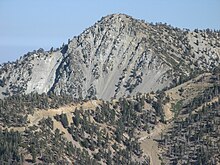San Gabriel Mountains National Monument
| San Gabriel Mountains National Monument | |
|---|---|
 | |
| Location | Los Angeles County, California, United States |
| Coordinates | 34°15′0″N 117°50′20″W / 34.25000°N 117.83889°W |
| Area | 452,096 acres (182,957 ha) |
| Established | October 10, 2014 |
| Governing body | U.S. Forest Service |
| Website | San Gabriel Mountains National Monument |
The San Gabriel Mountains National Monument is a United States National Monument managed by the U.S. Forest Service, which encompasses parts of the Angeles National Forest and the San Bernardino National Forest in California. On October 10, 2014, President Barack Obama used his authority under the Antiquities Act to create the new monument, protecting 346,177 acres of public lands in the San Gabriel Mountains of the Transverse Ranges.[1] The effort to protect the San Gabriel Mountains began more than a century earlier, in 1891 with another U.S. President, Benjamin Harrison, the 23rd president, using a congressional act, to designate and delineate the first federal protection in the United States of forested lands, using the same mountain range name, as the San Gabriel Timberland Reserve. Two earlier California conservationists, Abbot Kinney and John Muir, influenced President Benjamin Harrison.
Geography
[edit]
The monument covers the central and northern regions of the San Gabriel Mountains, extending west to east from Upper Sand Canyon at Little Tujunga Canyon Road to Telegraph Peak. It contains the Sheep Mountain Wilderness, the San Gabriel Wilderness, and Pleasant View Ridge Wilderness. Most of the major peaks of the San Gabriels are within the limits of the monument, including Mount San Antonio, Mount Baden-Powell, and Throop Peak. The Silver Moccasin Trail lies within the monument. The monument only covers a limited portion of the range's western extent, and much of the southern portion of the range has been excluded from the monument. It does not contain the Cucamonga Peak region.[2]
Monument history
[edit]The movement to further preserve the San Gabriel Mountains began in 2003 when then Congresswoman Hilda Solis initiated an environmental feasibility report to see if it was possible to increase protection by National Monument designation.[3]
Establishment of the National Monument
[edit]
The National Monument was established on October 10, 2014, by proclamation of President Barack Obama under the Antiquities Act. More than 15 million people live within 90 minutes of the San Gabriel Mountains, which provides 70 percent of the open space for Angeleños and 30 percent of their drinking water. Polling indicated that 80 percent of Los Angeles County voters supported the proposed protection of the San Gabriel Mountains and rivers.[4]
The creation of the monument was in response to decades of input and support from the local community demanding greater environmental protections for the heavily touristed region. There have been longstanding concerns about pollution and vandalism in the region's subalpine forests and watersheds. Public health and Latino groups also advocated for protecting the public lands in the San Gabriel Mountains as an opportunity to protect access to open space and outdoor recreation as a way to counter the shortage of parks and open space in Los Angeles County which they claim has contributed to high childhood obesity rates.[5]
The Obama administration cited the presence of endangered species, important cultural resources, and the threat of unreliable funding for management and encroaching development as the proximal reasons for the establishment of the monument. In addition, all existing rights-of-way continue to be honored and existing recreational activities — such as hiking, camping, fishing and cycling — will be unaffected.[6]
Local officials, including Los Angeles Mayor Eric Garcetti, cheered the news along with Hispanic, recreation, and conservation groups.[7] Its establishment faced limited opposition from local residents. To alleviate concerns, the extent of the monument does not cover most of the southern slopes of the San Gabriel Mountains, and excludes towns in the region.[6]
Expansion
[edit]In May of 2023, Representative Judy Chu and Senator Alex Padilla introduced a package of bills that would expand the monument by over 100,000 acres and additionally designate 31,000 acres as protected wilderness.[8][9] In June of 2023, Chu and Padilla sent a letter to President Joe Biden asking him to expand the monument by proclamation under the Antiquities Act.[10] In May of 2024, President Biden issued a proclamation expanding the monument by 105,919 acres.[11][12]
See also
[edit]- San Gabriel Mountains−related topics
- Natural history of the Transverse Ranges
- List of national monuments of the United States
References
[edit]- ^ "President Obama Designates San Gabriel Mountains National Monument". whitehouse.gov. 10 October 2014. Retrieved 10 October 2014 – via National Archives.
- ^ USFS Map(broken link)
- ^ Modern Hiker (27 Mar 2015). "What's Next for the San Gabriel Mountains National Monument?". (broken link)
- ^ San Gabriel Mountains Forever (18 August 2014). "Los Angeles County Voters Ask President to Protect San Gabriels". Archived from the original on 16 December 2014.
- ^ Jose Calderon (12 September 2014). "San Gabriel Mountains Should be Protected as a National Monument".
- ^ a b Louis Sahagun (10 October 2014). "Obama officially designates San Gabriel Mountains a national monument".
- ^ Laura Barron-Lopez (10 October 2014). "Obama names new national monument".
- ^ "Pasadena Congresswoman Joins U.S. Senator to Introduce Bill Expanding San Gabriel Mountains National Monument – Pasadena Now". www.pasadenanow.com. Retrieved 2023-06-26.
- ^ "Padilla Introduces Bill to Protect 1 Million Acres of California Public Lands". Senator Alex Padilla. Retrieved 2023-06-26.
- ^ "California Congress members call for expansion of San Gabriel Mountains National Monument". Los Angeles Times. 2023-06-26. Retrieved 2023-06-26.
- ^ House, The White (2024-05-02). "A Proclamation on Expanding the San Gabriel Mountains National Monument, 2024". The White House. Retrieved 2024-05-03.
- ^ Wigglesworth, Alex (2024-05-02). "San Gabriel Mountains National Monument expands by more than 100,000 acres". Los Angeles Times. Retrieved 2024-05-03.
External links
[edit]- San Gabriel Mountains National Monument
- National monuments in California
- San Gabriel Mountains
- Protected areas of Los Angeles County, California
- Angeles National Forest
- San Bernardino National Forest
- United States Forest Service national monuments
- National monuments designated by Barack Obama
- Protected areas established in 2014
- 2014 establishments in California

